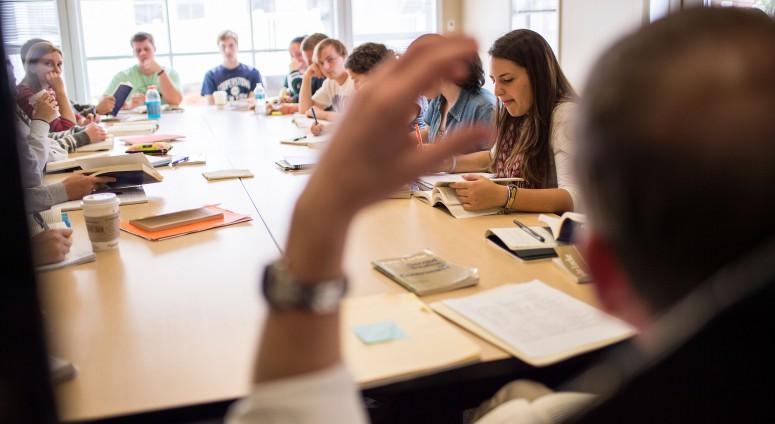Quest for Knowledge

From Kenyon News - March 24, 2015
If there is one class that epitomizes Kenyon, it may well be PSCI 101Y, otherwise known as “Quest For Justice.”
“We get good press,” said Tim Spiekerman, chair of the Department of Political Science, about the course that has been taught here for almost 50 years. “It’s the model we like to advertise: Asking serious questions in the company of students without the agenda of what the answers to the questions are.”
The course — one of the few yearlong classes — explores the relationship between the individual and society by studying the writings of philosophers, statesmen and novelists, with a reading list that includes Plato, Aristotle, Shakespeare, the Federalist Papers and portions of the Bible. “We don’t read secondary sources,” said Fred Baumann, professor of political science, who has taught at least one section of the course every year since he came to Kenyon in 1980. “It’s not an intellectual history course.”
The College usually offers seven sections of “Quest,” with a quarter to a third of all first-years opting to take a course. It is structured as a seminar, not a lecture.
“It was really challenging, but it was my favorite class my freshman year,” said Devon Beeny ’15 from Cache Valley, Utah, who credits the class with sparking her desire to be a political science major. “It was great to think about things that I hadn’t always thought about that critically. What is justice really? I always took that for granted. Justice is what is right, what is good. But it’s so much more complicated than that.”
Peter Orlos ’18, an undeclared major from Cancun, Mexico, describes the class as “mind opening.”
“As human beings, we’re used to seeing just one side — what the media shows us, what our parents tell us, what we’re brought up with,” Orlos said. “It’s always good to see the other part of the argument.”
Matt Williamson ’18 from Seattle describes his first day in “Quest” as “shocking.” “I remember leaving thinking, ‘Man I’m totally out of my depth here, but I’m going to keep on going and hopefully I will sink into it eventually.’”
Baumann says that response is typical, and that most students don’t begin to fully grasp the material until later in the course. “The idea is it clues them in to the great conversation about human nature and justice that’s been going on in the West for thousands of years,” he said. “We’re going to do the best we can to argue it out, to think about the consequences of it all.”
“Quest For Justice” originated with Robert Horwitz, the professor credited with reforming the political science department in the 1960s to focus on political philosophy instead of social science. The class hasn’t changed much since it was introduced with two exceptions. First, after the Soviet Union collapsed, Kenyon cut back on the teaching of classical Marxism, and after the terrorist attacks on 9/11, the professors built in a section on international relations and justice in foreign policy.
While the material has not changed, Baumann says he never tires of teaching the curriculum. “I’ve never gotten bored. I don’t know anyone else who gets bored,” he said, noting that each class is different, each discussion is different and that his own views can change based on the arguments he hears in class.
The discussions ignite the passions of students, too. “I take enjoyment from it being a discussion, a learning environment where we all learn together,” Williamson said. “It’s not put on the table for us to eat. We all kind of make the dish and eat it together.”